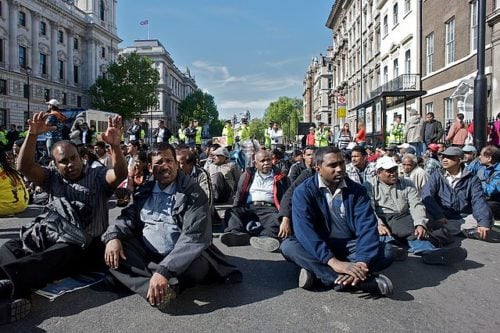Protecting the right of peaceful assembly has never been more important, with widespread protests in recent years met by an array of repressive practices and restrictions, including limitations on gatherings imposed in response to the COVID-19 pandemic. It is timely and vital, then, that on July 23, 2020, the UN Human Rights Committee adopted General Comment No. 37: the Committee’s first comprehensive guidance on the right of peaceful assembly, as enshrined in article 21 of the International Covenant on Civil and Political Rights.
General Comment 37
Landmark Guidance on the Right of Peaceful Assembly

Overview
The Comment sets forth principles and standards on a range of important issues relating to protests and gatherings, including online assemblies, internet shutdowns, LGBT rights and peaceful protest, the policing of peaceful assemblies, notification and authorization requirements, and the surveillance and monitoring of assemblies. These progressive principles and standards include:
Scope of the Right of Peaceful Assembly
- The right of peaceful assembly protects online gatherings.
- An assembly cannot be deemed violent or non-peaceful just because it involves disruption of movement or civil disobedience.
- States have an obligation not to interfere with peaceful assemblies without compelling justification, they are obligated to facilitate them.
- States cannot block internet connectivity in relation to peaceful assemblies.
Restrictions on the Right of Peaceful Assembly
- Authorities should first apply least-intrusive limitations on assemblies, prohibition should be a last resort.
- Restrictions on assemblies must not be based on the message of the assembly.
- Assemblies must be allowed to be held within sight and sound of their target.
- “Public order” cannot be used to justify overbroad restrictions.
Duties and Powers of Law Enforcement Agencies
- Only law enforcement officials trained in the policing of assemblies should do so, not the military.
- Officials must exhaust non-violent means, provide a warning, and only use the minimum force if it proves necessary.
- Assemblies may only be dispersed in exceptional cases.
- Less-lethal weapons should only be used as a last resort.
- States must investigate allegations that law enforcement officials have engaged in violations in relation to assemblies.
Notification Regimes
- Having to apply for permission or authorization to organize an assembly is contrary to the idea that peaceful assembly is a basic right.
How can civil society use the General Comment?
Activists and experts can use the General Comment to engage in research, advocacy, awareness-raising, and training to advance respect for assembly rights. Ideas on how to use the General Comment include the following:
Assessing Compliance with the General Comment
- Analysis of legal frameworks and official practices.
- In-depth examination of recent assemblies.
- Comparative studies of regional practices.
- Monitoring of government practices.
Conducting Advocacy with Key Actors
- Advocacy with government officials.
- Litigation before national and regional courts.
- Submissions to UN Human Rights Committee and Special Rapporteurs.
- Development of protocols with local authorities.
- Revision of notification and authorization procedures.
- Guidance and training for law enforcement officials regarding policing.
- Outreach to Internet Service Providers (ISPs) and platforms.
Supporting Training, Education, and Awareness-raising
- Public awareness-raising regarding problematic laws and official practices.
- Trainings for civil society on the General Comment.
- Trainings for journalists on applicable standards regarding assembly.
- Incorporation of the Comment into legal education curricula.
- Specific outreach to marginalized communities.
Key Resources
General Comment 37
The comment was adopted on July 23, 2020, during the UN Human Rights Committee’s 129th online session. It has been made available in English, French, Spanish, Arabic, Russian, and Chinese (official UN translations); and Portuguese (informal translation).
A Short Guide for Activists
This tool offers detailed guidance for civil society organizations on using General Comment to help advance freedom of peaceful assembly through advocacy, awareness-raising, and training efforts at the local, national, and regional levels
Digitally-mediated Assemblies and the UN Standards
This ECNL factsheet on protests taking place in the online space and how international human rights standards, including General Comment 37, ensure their protection.
Assemblies in Private Spaces
This ECNL factsheet focuses on different aspects of the right of peaceful assembly and how international standards, including the UN General Comment No. 37, apply to private gatherings.
Contact Information
For further information concerning the General Comment, please contact Nikhil Dutta, ICNL Global Programs Legal Advisor, ndutta@icnl.org.
Organizational Statements
ICNL worked with partners, including the European Center for Not-for-Profit Law (ECNL) and the Civic Space Initiative (CSI), over a two-year period to provide assistance to the Committee in developing the Comment, and we will continue working with Committee members and partners to ensure that this guidance is deployed to protect assembly rights around the world.

This information material is wholly financed by the Government of Sweden. The Government of Sweden does not necessarily share any opinions here within expressed. The authors bear the sole responsibility for the content.
Sign up for our newsletters
Sign up